#but he was speaking English to me so he pluralized it for English
Explore tagged Tumblr posts
Text
Teaschooler just found me in the bathroom and announced, eyes twinkling, delight in every feature,
“Mama! Seehunds! In my audiobook!”
#he knows how to pluralize Seehund correctly in German incidentally#but he was speaking English to me so he pluralized it for English#Summer of the Sea Serpent btw#this is his first introduction to selkies and I am EXCITED#what games will he play with his Seehund stuffy now?
5 notes
·
View notes
Text
Writing Russian-speaking characters
So I have once again been chuckling at some adorable clumsy Russian in Nikolai and Nikto fics, and thus I decided to make a little list that might be helpful for fellow COD writers here. And yes, please, feel free to reach out to me if you need any proofreading of your Russian phrases, I would be glad to assist since google translator can butcher it in ways non-speakers won't be able to notice.
I would really appreciate if you guys shared this post and helped it reach people that might need it, I put way more effort into it than I expected myself <3 Also, I might make a followup with some more words and/or phrases that can be useful, so please feel free to request some, since here I am mostly focusing on terms of endearment.
I will write down Russian words, their (approximate and wonky, sorry for that) transcription/transliteration and what part of speech they are (keep in mind that adjectives can be used as nouns when used to address someone) and provide according translation and use.
Keep in mind that in Russian the gender of the word is important!!! I'll write down them in following order: he/him (он/его) version/ she/her (она/её) version/ they/them (они/их) version. However! They/them is NOT traditionally used as gender-neutral pronouns, it's plural only. Some queer and younger folks do use they/them (myself included), but it does sound wonky as it's direct copy from English. Unfortunately, Russian is not very suitable for gender-neutral writing, but there are ways to go about it (I'll try to note some of that too).
*however, since Nikto is sometimes using plural they/them to describe himself, that would be okay with him since it's plural. I hope that makes sense, lol.
So if you're putting an adjective with a noun (example: милый котик) you have to use an adjective in the correct gender form FOR THE WORD! If the noun (котик here) is masculine, you use masculine adjective form EVEN if you're referring to a person with she/her pronouns.
What is love?
The main thing I noticed is that y'all use a direct translation of the word "love" - "любовь" [l'ubov'] (n) to refer to a person. As in "how are you doing, love?". However, that's wrong. "Любовь" is either a word to describe the feeling, or a name (short version would be Люба [Lyuba]). If you wanna use an affectionate pet name, consider one of the following!
дорогой/дорогая/дорогие [dorogoy/dorogaya/dorogiye] (adj) - means "darling". Often used between spouses. Mostly used to refer to person directly, sounds a little quirky if you use it to refer to them in third person (as in "my darling went out to buy some strawberries").
любимый/любимая/любимые [l'ubimiy/l'ubimaya/l'ubimiye] (adj) - means "beloved/loved/loved one" and is probably the closest to "love". You can use it to refer to person directly or to talk about them in third person (as in "can't wait to see любимую". Also yes, the endings are changing depending on the case and I'm not entirely sure how to explain this concisely without going deep into grammar lol).
милый/милая/милые [miliy/milaya/miliye] (adj) - the word means "cute/cutie", but is also used as a general terms of endearment, like "sweetheart". Mainly to refer to someone directly, using it in third person is a little old-fashioned I'd say. Also commonly used by people outside romantic partnership, a kind old lady can definitely call you over with this one asking to help her read expiration date on a milk bottle or something.
любовь моя [l'ubov' moya] (n + adj/pronoun) - okay, I kinda tricked you saying you can't use the word "love" to refer to a person. If you say this (means "my love"), you can! It's pretty romantic and I am actually the one person that uses this daily, otherwise it's either very romance-novel/old-fashioned sounding, but there are moments when it's perfectly suitable. Have that fairytale moment! Also please note, that while "моя любовь" [moya l'ubov'] (adj/pronoun + n) is grammatically correct, it sounds kinda weird if you use it to address the person directly (like in a phrase "my love, you shine brighter than the stars"). While Russian doesn't have particularly strict rules about word order, it does matter to some extent, and this is a prime example: people just use one order way more often that the other.
Pocket-sized
I've already told somewhere here my favourite Nikto fic moment: the sweetest, romantic moment, interrupted by him calling reader "детёныш", which means "cub" as in baby animal. And while my parents do use this word affectionately, I can assure you, most people don't, and it was clear that this was a result of a clumsy translation of "baby" or something like that. So here are some variants for words like baby, little one and such!
малыш/малышка [malysh/malyshka] (n) - I'd say this feels more "little one" than "baby" to me, it's a tad less sexually charged if you get what I mean. Also, you call "малыш" a person of any gender/pronouns, while "малышка" is strictly for she/her. Obviously can be used for kids too.
детка [d'etka] (n) - this one is definitely "baby" or "babe" as a term of endearment, calling a real kid this would be WEIRD if you're not a really old granny. I would also say that it's more commonly used to refer to female partners, but that might be just my perception and experience. It's still okay to use both ways. Also this word can be very much used if you need a little bit of sleazy/catcalling/bad pickup line energy, like someone shouting after a girl passing by on the street. Yuck.
маленький/маленькая [mal'en'kiy/mal'en'kaya] (adj) - this just means "little" or "small", I'd say it's used less commonly and usually in this form "маленький мой/маленькая моя" [mal'en'kiy moy/mal'en'kaya moya] (adj + adj/pronoun). I will expand on this a little later here! Can be used to refer to kids too.
All kinds of fauna
While poor детёныш is reserved for furry freaks like yours truly, there are some animal nicknames that are very widely spread! Here are some that I think would be most useful for y'all. Granted, some people think that these are a lil' bit cringey, but I think it really just depends on what you're used to hear around you. So if I think calling someone a cub is cute, and bunny is cringe, that probably says more about me :D
котик [kot'ik] (n) - this is a term of endearment for a cat. NOT same as kitten, mind you! Mostly used to refer to men (since the word is of masculine gender) - in my experience.
котёнок [kot'onok] (second o here is like ö in German) (n) - now THIS is "kitten". I would say this is more gender-neutral than the previous one, but the word is still masculine gender.
зайка [zayka] (n) - I believe this would be an equivalent to "bunny", although it's actually a cute word for a hare, not a rabbit. Definitely used for all genders (also the word can be both masculine and feminine gender), also is okay to use referring to kids (even teachers that are into endearing nicknames can call pupils this and it's not weird. well, in elementary school). You can also say "зайчонок" [zaych'onok] (n) which is a word for baby hare, even cuter.
рыбка [ribka] (n) - a term of endearment for a fish. I think it's viewed as a bit old-fashioned and thus only used jokingly nowadays, but you know what? Nikolai could pull this off 100%. Bonus points if it's "рыбка моя" [ribka moya] (n + adj/pronoun). Only used for women and the word itself is of feminine gender.
медвежонок [medv'ezhonok] (n) - now, I actually have never met someone who would call their partner this, but I myself would (and I definitely saw it in some media, but that's obv not too reliable). It's a word for a bear cub, so I think it's cute to call a huge ass bear of a military man this word. It's of masculine gender, but I would say it's okay to call a she/her person this too. ALTHOUGH there is a grammatically incorrect (but this only adds to cuteness as it often happens) word "медвежонка" [medv'ezhonka] (n) - this would be a female bear cub. My family uses this word, I use it, no, it won't be in a dictionary, but everyone will understand what you mean. Is okay to use for kids too.
щенок [sh'enok] (if it helps, щ is like German "schtsch", like in Borschtsch, like sh but soft) (n) - now, this actually is not used as a term of endearment, it's "puppy" and it's suitable for degradation. The word is of masculine gender, but you can call anyone this to be honest. You can tell Nikto he's "глупый щенок" [glupiy sh'enok] (adj + n) (silly puppy) and that man will either bark for you or gut you. If you say "тупой" [tupoy] (adj) (dumb) instead of "глупый" [glupiy] (adj) (silly), it will be downright offensive. You can say "щеночек" [sh'enochek] (n), which is an endearing term for a puppy, so it's a little bit sweete. OR you can use my personal favourite - "щен" [sh'en] (n), which is actually also incorrect, but if you've ever heard of a great poet and poetry innovator Mayakovskiy, he was called this word by Lilya Brik. I do NOT have the time to unpack that wild relationship (there was a throuple involved. Russian poetry scene of early XX century was WILD and it's my favourite poetry period hands down), but it's pretty famous. The word "щен" consists of the word "puppy" but with the end diminutive suffix cut off. The trick is, that while some words return to their non-diminutive form with such procedure, this one does not - so you're basically inventing a new word that now sounds quite degrading and harsh, but also sexy as hell (personal opinion). I would definitely call Nikto this word.
птичка [ptich'ka] (n) - that's just "birdie", but I actually wouldn't say many people use it to refer to each other. HOWEVER, Nikolai 100% calls his steel bird this. The word is of feminine gender and if you are calling a person this, it's probably more suitable for a woman.
цыпа [tsipa??] (n) or even цыпочка [tsipoch'ka] (n) - that's a chick, like a baby hen, used only to refer to women (feminine gender word). Honestly I only heard this in foreign films dubbed in Russian or like in jokes/sarcastic phrases. It's kinda rude/indecent/vulgar and the only man that can say that and stay attractive is Captain Jack Sparrow (he used this word in Russian dubbed Pirates like once maybe, talking to Elisabeth, and that was funny cuz he be crazy like that). But maybe you want this, idk.
And everything sweet
Unfortunately, I haven't seen anyone translate the word "honey" as "мёд" directly, that would be another brilliant laugh (cuz it's wrong to refer to a person like that), but there are some "sweet" words to use!
сладкий/сладкая [sladk'iy/sladkaya] (adj) - this just means "sweet", like the taste, and it can be sexy or sleazy or just cute. You can call a kid this word too, BUT for a child would be better сладенький/сладенькая [slad'en'kiy/slad'en'kaya], which is like one step further into diminutive-endearing department.
конфетка [konf'etka] (n) - this is a diminutive word for a candy, a sweet, like a caramel or chocolate or whatever. Not very common, but is cute. Also a way to describe a sexy/good-looking person (more likely a woman, the word is of feminine gender) or just something really good (a bit jokingly). The latter is usually used in a phrase build like "не ..., а просто конфетка", which is roughly translated "that's not ... that's just plain candy". Might have an actual English equivalent that I can't think of right now. Maybe "a total snack"? Probably that one, yeah. Can be said about anything, a car for example.
Shiny
I wanna stick in a few more words of endearment and they all are kinda shiny, lol, so here you go!
солнце [solntse] (n) - this means "sun", like that big glowing thingy in the sky, but it's very welcome as a term of endearment. This word is NEUTER gender (explained in the next section). Viktor Tsoy (a famous rock musician with an unfortunate fate and immortal cultural heritage) had a song ("Cuckoo" - "Кукушка") with the words "солнце моё, взгляни на меня" [solntse moyo, vzgl'yan'i na m'en'ya] (my sun, look at me), so "солнце моё" (n + adj/n) is a good one. You can also use "солнышко" [solnyshko] (n) which is an endearing version of "sun", so it's like "sunshine". Also of neuter gender! Can and should be used to address kids too.
золотце [zolottse] (n) - this literally means like... a little gold? A little golden piece? I don't think there's a proper equivalent in English. It's a word of neuter gender and it's very much used for kids too. Another version would be "золотой мой/золотая моя/золотые мои" [zolotoy moy/zolotaya moya/zolotiye moyi] (adj + adj/pronoun) - this is "my golden", it's a little less common and I feel like it's often used to be condescending, but it's not inherenrly bad, so you can use it for a loved one.
сокровище [sokrov'ish'e] (once again it's щ, look previously) (n) - this is a word of neuter gender and it means "treasure". I personally adore this one and it's pretty common. Can be used for any gender and for kids!
звёздочка [zv'yozdoch'ka] (n) - this is like a little star/starshine. Wouldn't say it's that common, but I use it a lot. The word itself is of feminine gender, but you can call anyone that! Or you can say "звезда моя" [zv'ezda moya] (n + adj/pronoun), which means "my star". Also feminine gender word, but can be used for anyone.
This dog belongs to...
I am not going to go too deep into sexy/sex-related words in this part, because I'll just get overwhelmed with the amount, but I want to go over some words of ownership quickly.
мой/моя/мои/моё [moy/moya/moyi/moyo] (adj/pronoun) - this means my/mine. It goes really well with many words in this list, especially the adjectives, like "мой дорогой" [moy dorogoy] (my darling) or "солнышко моё" [solnyshko moyo] (my sun/sunshine). The last version, "моё" [moyo] is neuter gender, it's NOT gender-neutral! It's the "it/its" I guess (not exactly, but let's just stick with this simplyfied explanation). Previously there were some words of that gender, so here you go. BTW I would say that in speech it's more common to put this word before adjectives and after nouns (like in my examples), just sounds better, but it's not wrong to do otherwsise. You can also just say "ты мой" [ti moy] (you're mine). Also can be used to refer in third person, like when you're discussing your man with your gossip girls, you can just go "а мой вчера..." [a moy vch'era] (and mine yesterday...) and everyone will understand that you mean your man. Unless you wee discussing pets, then they'll probably assume it's your cat.
хозяин/хозяйка [khoz'yain/khoz'yayka] (n) - saw this one too btw. This means "owner" or kiiiinda "master/mistress", and they are gendered, so it's actually wrong to call a woman "хозяин" unless there's some kinky genderfuckery going on (which I'm all for, but like. you get what I mean).
господин/госпожа [gospod'in/gospozha] (n) - okay, THAT is definitely master/mistress, also gendered. Standard BDSM terminology and yada yada.
And that's where I'd like to wrap up for today! However, if needed, I can write more - perhaps with curse words or with sex-related words, or some phrases? I dunno, you tell me! Once again, I kindly ask you to share since I think this will help people (and while I understand the struggle of writing in another language and especially using words from language you don't speak at all, I can't help but be a little thrown off every time I see a wrong use of words in text).
Also remember: while Siberia is bigger than USA or even Canada, there are still other regions in Russia that deserve to be mentioned <3 a lot of places with mindblowing nature, cultural heritage etc.
#cod#call of duty#cod writer#nikto cod#nikolai cod#russian#nikto#nikolai#writers on tumblr#nikto x reader#nikolai x reader#nikprice#nikolai x price#price x nikolai#nikto x krueger#krueger x nikto
963 notes
·
View notes
Text
Baldur's Gate 3 - Non-binary Translation in Spanish
A while back I had mentioned that when I learned how to change language settings for Baldur's Gate 3, I was curious to learn how they would adapt the non-binary [no binario] option into Spanish since Spanish (like many Romance Languages) is very gendered
What I saw actually surprised me a bit
Usually in game translations with different genders, English tends to treat you as a "they" even though it's usually male or female; and in Spanish most of the lines are gendered, or phrased in a very ambiguous way in translation like speaking of your character as una persona "a person" rather than "he" or "she", or "they"
This is one of the first times I've seen the gender neutral -e endings used in an official setting
-
For the purposes of this, and any future posts on this, I decided I would try to play as a non-binary gnome cleric. I should also mention that when you start up the game in Spanish and you do the character customization, everything starts you with the base word (i.e. masculine by default, or possibly agender but looks masculine)... as in you can choose to be elfo "elf", semielfo "half-elf", humano "human", semiorco "half-orc"... choose between bárbaro "barbarian", mago "wizard", brujo "warlock" and so on
My default character creation screen read gnomo, clérigo for "gnome cleric"
But the way your character is addressed by others is what changes
The first NPC you interact with is "Us" a little brain thing you can choose to help. If you do it calls you "friend":
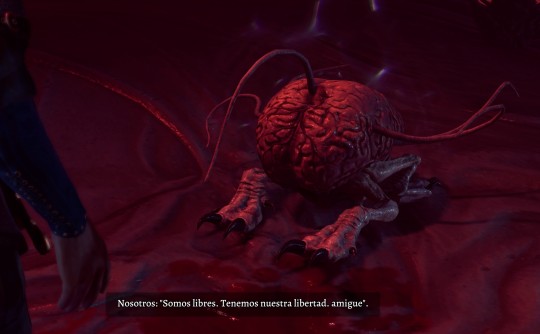
Nosotros: Somos libres. Tenemos nuestra libertad. amigue Us: We are free. We have our freedom. Friend [nb].
The word used is amigue
For the sake of understanding Spanish grammar, you probably know amigo/a "friend". The G here is a hard G. The gender neutral ending is E... but the combination of GE is pronounced like an H sound in Spanish [la gelatina "gelatin" for example is like "hel-a-ti-na"]. To preserve that hard G sound, you have to add a UE to it... so amigo/a becomes amigue for non-binary
[if you study Spanish this is the exact same grammar you'll see in turning -gar verbs into subjunctive forms; why pagar would turn to pague]
The next person you come across is Lae'zel:
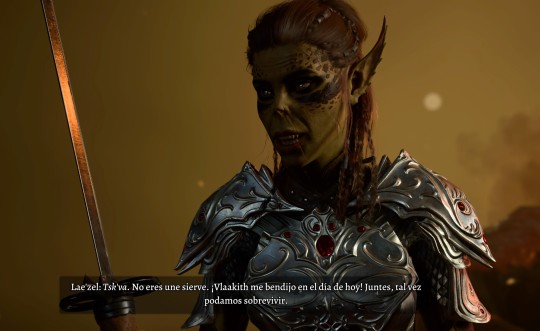
Lae'zel: Tsk'va. No eres une sierve. ¡Vlaakith me bendijo en el día de hoy! Juntes, tal vez podamos sobrevivir. Lae'zel: Tsk'va. You are no thrall [nb]. Vlaakith blessed me today ["on this day of today"; emphatic]. Together [nb plural], we may (yet) survive.
Interestingly, there's first siervo/a meaning "servant" or "serf" or "thrall"
What I found very interesting was that you have une... un and una being "a" are used for indefinite articles; the non-binary form seems to be une
What threw me off though was seeing juntes... now junto/a is "together" [lit. "joined"] but juntes implies a non-binary plural.
I don't know if this is because in Spanish grammar it would imply that non-binary trumps feminine [the way amigos "friends" could be male+female or multiple male, as opposed to amigas "friends" being all female]... or if it's maybe an error or something else; the game treats Lae'zel as a woman in every other regard so I think it's the first one which is a situation I somehow hadn't considered. I had just assumed it would be juntos ...or juntas if you played female
Next I decided to rescue Gale first because he uses a lot of adjectives/professions and I wanted to see what they looked like:

Gale: No serás clérigue por casualidad, ¿verdad? ¿Médique? ¿Cirujane? ¿Increíblemente hábil con una aguja de tejer? Gale: You wouldn't happen to be a cleric, right? A doctor/medic? Surgeon? Unbelievably skilled with a knitting needle?
First is clérigo/a "cleric" being used in non-binary as clérigue. Similarly we have médique which is the non-binary médico/a for "medical doctor"
[just like above C turned to QUE to preserve a hard C/K sound; you'll see this with subjunctive and even preterites of -car verbs... why atacar "to attack" will turn to ataqué "I attacked" and ataque in subjunctive... because CE has a soft S sound in Latin America, and can be lisped in Spain]
And next is cirujane... the word cirujano/a is "surgeon"
Finally important note - hábil being "able" or "skilled" is a unisex adjective, so there is no change in any gender - masculine, feminine, or non-binary
*Note: I did miss it but at some point someone used the article le to describe my character. The el and la "the" are the masculine and feminine definite articles; le is non-binary "the" which still catches me by surprise because it looks French to me
-
I've been told since I made the original post that people have seen the non-binary E ending used in other things, but this was special for me to see. I'm curious how the other gendered languages available treated non-binary options
It was a fun surprise for me, especially for some modern day Spanish linguistics in a VERY big modern game, with non-binary word choices being heavily prominent. It's a bit of a learning experience for me
If I find any more fun examples of NB language being used I'll let y'all know as I go
#bg3#baldur's gate 3#spanish#language#langblr#translation#long post#non binary#linguistica#fun with translation
764 notes
·
View notes
Text
For those who are fans of ты (you, informal) versus вы (you, formal or plural), there's an interesting thing that Russian-version Andrey does with those pronouns when you meet him for the first time in the Bachelor's route.
He has his English line, I'm Andrey. Andrey, not Peter; don't you dare call me that. I'm quite a quarreler - and I don't want to discredit my soulmate! and the main differences between this and the Russian are in the final and first lines. In the final line, in Russian, it's actually "I don't want you to think badly of my brother!" There's a whole 'nother line that's missing at the start though, and it's like this: "While I'm alone, you can say to me 'you.'" Which, I'd imagine, is Andrey telling Daniil that they can speak informally like friends (Daniil does, in the next line, say тебя instead of вас, the informal conjugation, and in the previous line addressed Andrey formally with вас).
But there's that funny double meaning where вы is both formal and plural, not to mention that the word for alone, here, is один, which is both "alone" and the number one.
So, if you think too hard about what Andrey is saying, he's kind of implying there's a state where he can be multiple people, and in that state when he's two and not one, refer to him in the plural. The English, I'm assuming, tries to make up for this by having Andrey say "soulmate" instead, but it's just not the same ...
347 notes
·
View notes
Note
Do you have any Jack Spicer headcannons?
DO I????????
Yea I do let's get into his brain, education, and stunted cultural connections. (Also pro-tip, the entire series in, what I believe is a full digital remaster, is available on dailymotion right now. The quality is immaculate it's like, unbelievably good to look at.)
1. His mother is a second generation Chinese-American, his father is an American businessman. From the architectural structure of his house- and, there aren't any good screencaps I have on hand for this but the interior shots we see of his house that aren't his lab or bedroom- and his proximity to the temple I don't doubt they've relocated to China. That said "Spicer" is a pretty European last name, and nobody come for me but his cousin Megan? That's a little white girl. He's theoretically and functionally closer to Chinese culture, but his education has swayed pretty exclusively western which I'll circle back around to after some context.
2. Despite being closer with his mother than his father growing up, he speaks very, very little Mandarin. His mother speaks English and Mandarin almost equivalently, as she grew up speaking both, but growing up in America with her own American father, English was the language she got more use out of before moving. Jack's father on the other hand can have, at best, a highly stilted simple conversation in Mandarin, He say hello, introduce himself, ask how you are, etc. but not much further in depth. So aside from a few exchanges, English was the primary spoken language in their home. He absolutely can not to save his life read or write in Chinese, traditional or simplified. He can recognize maybe 3 words if they are very, very clearly printed and spaced out. To be fair he isn't great at reading and writing in English either.
3. He has pretty severe dyslexia, phonological and surface. He tends to spell out any words he doesn't know phonetically, and on paper he struggles the most with directional letter orientation, (sz, nu, bdpq, mw) and sometimes formative lines (OQ, NMVW, PRF, XY, Il). A lot of time's he'll either purposefully capitalize a certain letter to differentiate it from a different, similar letter, write the correct letter backwards, or do both. Speaking out loud is much easier, but still presents occasional difficulties, especially with words that change with plurals/tenses in ways other words don't. (house->houses= mouse->mouses + years of "No Jack it's mice" = mouse->mices).
4. This does not change the fact that he's very, very intelligent. He has an exceptional grasp on engineering which we see in the show, but it's more than just welding metal together. He's able to develop schematics for complex machinery and execute them in record time. The boy made An Actual Working Time Machine That Worked. If you put a piece of paper with a complicated mathematical equation written on it in front of him he would look at you like you just asked him to perform a miracle, but if you, out loud, pose a hypothetical scenario in which the same equation could be applied, without even specifying the equation itself, he could run the numbers in his head and he could do it fast. Written numbers, ESPECIALLY with variables presented as letters, are like looking at alphabet soup. You write A²+B²=C² and he assumes you're stupid because the answer is obviously 25. (4²+3²=25) (16+9=25) so where are you getting 0 from? What do you mean that says ABC and not 430? This is math?
5. All of this strongly contributed to him being home schooled, working with translators and aids was already a headache for his parents, and that's before throwing the ADHD into the mix, once his classmates reached an age where they realized they could make fun of him for all of the above it just wasn't worth it anymore, and homeschooling it was. This was both a blessing and a curse for him, because while he was able to focus on what he wanted, without any of that silly "show your work" nonsense, he improved to the level he's at now by sheer self motivation. Unfortunately he had no self motivation for anything he Wasn't interested in, it started as not wanting to work on things to being flat out unable to make himself do so. Who cares if he writes an S backwards? He can read it. To him that's better than trying his best to improve and messing it up anyway.
6. We know, canonically, that he is afraid of genuinely failing. He scares himself out of a redemption arc because he fully believes he's going to fail at being good the same way he's failed at being evil. It's actually much less intimidating to fail at being evil. Unpacking that even further, he is less afraid to disappoint Wuya, evil witch who at full power could and tried to kill him, and Chase young, his evil hero who he blatantly has a massive crush on, who could also kill him, than he is to genuinely try and redeem himself and become close to the monks only to fail and let them down.
7. When I said his education was swayed western, I mean linguistically, getting him talking and writing in one language was already an uphill battle. Any interest he has in historical study is globally spread out and militaristic in focus, but most specifically on weapons and machinery. That's because his actual interest, the only area he genuinely feels smart in, is engineering. He leans into the fact that he's a genius in it because maybe, if he pushes it hard enough, no one is going to notice that he gets his S's backwards or writes out labels phonetically on his blueprints. Mental math is mental math in any language, technology is technology in any culture, and that's the only area he is able to really focus on anyway. And under Alllll of that, there's also the part that knows, if he gets better at linguistics his mother is going to try again to get him learning to write in at least simplified Chinese and speaking Mandarin, and it isn't even that he doesn't want to, he actually thinks it would be kind of cool, but he's not about to admit that. Because if he tries, genuinely puts his all into it, and still can't improve or figure it out, that's going to be a bigger let down than him never trying in the first place. Right?
Anyway this is like, a fraction of the headcanons I have about Jack Spicer. He is literally The Character Ever to me. If I listed Every headcanon I have I would actually hit the tumblr post character limit. He's blorbo from my shows. He's babygirl.
25 notes
·
View notes
Note
What pisses me off so much is that Salem has been claiming he "didnt actually do yellowface" and it was actually "a racial delusion" ... when there is genuine proof to show its fucking lies.
He wrote about the debockle on his private, he didnt seem deluded, he spoke eloquently, he wasnt apologetic but it didnt really come off like he was experiencing delusions at the time- he said "thats how he speaks in real life"
Which like..if it REALLY was a real delusion he was experiencing.. what the fuck is his idea of asian people to make him think this is how they all fucking talk? damn i didnt know delusions are an excuse for racism!
But no, he was very much concious and aware of his actions, to the point of addressing the allegations on his main account.. even though the delusion wouldve made him think the kung fu revvy one was his main, yes?
Whatever. my point stands to make it pretty clear he is lying about this delusion- maybe he does experience delusions but the yellowface situation was a concious decision and he is just fucking stupid.
He thinks mental illness (which he probably thinks he can transition into like a gender. fuckin radqueer) is an excuse for everything, he thinks mentally ill + neurodivergent people are all helpless r slurs that dont know any better, he thinks they are "baby bunnies >.<" which he strives to be, a helpless stupid fucking lunatic that can get away with everything because he says he has "prolapsed anus syndrome" which is a syndrome that prolapses your anus. So clearly he isnt in the wrong here guys! he is unaware of his actions and is too fucking stupid to take accountability! NO I MEAN! nyaa im so ableist >.< he is a helpless baby and we should always forgive him because he is too baby bunny boi to learn and be better, kyaaa~!
Ugh.
If youre so fucking mentally unstable, Salem, maybe stay off the fucking internet... we dont need you coming back with your Mexican Sona called "jimmy changa" who is an axolotl boy with a sombrero, poncho and giant breasts.
i have been seeing a lot of people defending puppy lately acting as if people's only issue with him is his furry art. very blatantly ignoring the part where he did genuine racist things, because they know being racist and then blaming it all on an alter is stupid. plurality or not you can still do terrible things. i have had systems explain to me even when their alters do bad things. the rest of the system is still responsible for and should accept the blame of their actions.
reminder, this is why people are the most angry. ""racial delusions"" do not cover this. and if it did this is how you see asian people in your head? not even discerning between chinese and japanese.
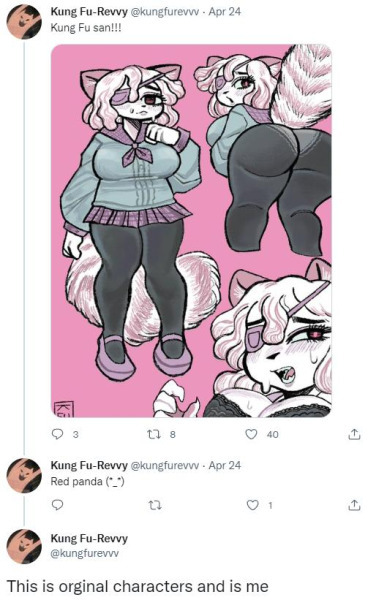

i also believe this is what puppy will say is one of his alters, adonis i think her name, is. which makes me wonder if this red panda alter speaks in incredibly broken english, they are obviously very...inspired.
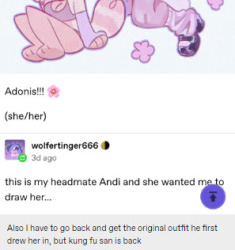
and yes i will draw attention, to this attitude again. because for all the talk about anti blackness, he has no allyship or understanding of his racism against other races. even his gf admitted to formerly defending zionist beliefs. they literally are not capable of forming their own thoughts. they simply parrot what they think gets them the most attention. then backpedal if their audience doesnt agree.
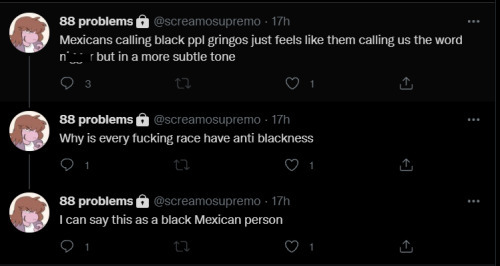

why is this any different from a white person, saying something racist then claiming to be "2% black", to get away from their racist actions.
26 notes
·
View notes
Note
Hey! Another Finn here but I want your English speaking audience to be able to understand as well.
For background information, I've been thinking a lot about nuances in pronoun usage in Finnish language ever since I had a brief discussion about genderless third person pronouns with an English speaking friend. I wanted to share what I have uncovered so far about the information that is instinctive to me.
For our English speaking folk, we have our official language (sometimes referred to as written or formal language) and a bunch of dialects and slang (collectively referred to as spoken language). They can vary vastly and pronoun usage is one of the most obvious indicators of roughly where a person is from. The spoken language examples I'm giving are from Southern Finland (not the capital area) as that's what I use. Also, because of the nature of Finnish language, the words can change their sound and written form when there's information added and sometimes pronouns are not needed as a separate word in a sentence at all.
In written language the singular pronouns are as such: minä (I), sinä/te (you), hän/he (he/she/they) and se/he (it)
Plural pronouns are: me (we), te (you), he (they) and ne (they when used as a plural for "it")
In spoken language it's a bit different: mä (I), sä (you, singular), se/hän (he/she/they/it), me (we), te (you, plural), ne/he (they)
You probably noticed something peculiar already and we're getting there.
When I started learning the written language in school, my teacher told me that hän refers to a human person while se refers to everything else. Also, if you want to sound formal and/or respectful when referring to someone you use plural forms when referring to them even if you're referring to a singular person, hence the use of te instead of sinä and he instead of hän or se. However, if the goal is to still sound as formal/respectful as possible you would not use ne instead of se, because ne implies a lack of personhood. It's always more polite to imply personhood even if you're not talking about people, but people will probably find it odd if you do imply personhood to things that aren't alive. So, with inanimate objects it's either se (singular) or ne (plural).
And there in lies the foundation for many nuances.
Some Finns are indeed taught that in written language hän can be used to refer to all living things while se can be used to refer to all non-living things, but that's not the case with me.
Hän implies personhood. Personhood implies consciousness and agency.
As a result, in spoken language hän is only used when you want to underline the agency of the person/living thing you're talking about. We also generally use se when talking about people because we can often hear from the context that this is someone with agency hence emphasis on agency is not needed, so it would be weird to do that. But when speaking about animals, if someone refers to an animal as hän and you don't also switch to hän it can leave the impression that you don't think this animal has any agency or anything else that comes with personhood, like emotions. Alternatively, it implies that you see animals as "lesser" and their emotions as "not important". Doubly so if the animal is a pet. It's polite to use hän when speaking about an animal, especially to the owner of said animal without prompting. It's rude to insist calling an animal se when someone has already referred to the animal as hän. But if you refer to a human as hän in casual conversation it has a whole another connotation.
As stated before, hän is used to underline agency in spoken language.
"Hän päätti nyt näin." He/she/they decided so this time. This implies that the speaker does not necessarily agree with the decision, made even more apparent by the speakers tone.
"Se on hänen päät��s." It's his/hers/their decision. Less friendly and more frustrated sounding version of "se on sen päätös" which means exactly the same. The latter implies more familiarity or warmth between the decision maker and the speaker and doesn't really imply frustration in the same magnitude. The first one can imply frustration either towards the decision maker, the situation or the one who is spoken to. Both mean that the speaker is not responsible for the decision, but while the first one implies that the speaker can't change the decision makers mind it even if they disagree with the decision, the second version implies that the speaker doesn't really want to change their mind even if they could try. Either way, the ultimate decision making power isn't in the hands of the speaker in this case.
But there's a secret option that has become more popular over the years. It's using hän when referring to non living things to imply agency in a way that's humorous. Like in a conversation I often heard and had in my home:
A: "Mä kolautin itteni pöydän kulmaan." I hit myself onto/ran into the corner of the table
B: "Hyökkäskö se pöytä sua päin?" Did that table attack (towards) you?
A: "Joo. Hän hyökkäs aika kovaa." Yeah. He/she/they attacked quite hard.
The "joke" was started when person B implied that an inanimate object can attack (which is an action requiring decision making) and then person A continued the "joke" by confirming that this table has a personhood and indeed decided to attack. It's not meant to make anyone laugh, it's meant to lighten up the mood and save person A from further embarrassment by implying that the whole ordeal was the tables fault.
But if the person B had answered in another way instead, they could have tried to further embarrass person A.
B: "Miksi sä hyökkäsit sitä pöytää kohtaan? Hän oli ihan viattomasti paikallaan." Why did you attack that table? They were innocently staying still where they were supposed to be.
This doesn't only imply that person A was at fault, but also that the collision was a malicious act towards an innocent person, who was just doing what they were supposed to do. While it's more likely to get a laugh out of people in the vicinity, it's not polite to try to further embarrass someone if you don't know they can take it from you.
Also, when someone is representing or speaking for a group, they are referred towards as if the representative is the whole group. The representative can also more easily to make clear their stance with the group. If they constantly use he when referring to the group, it means that the representative is not part of this group they are speaking for. If they use me, they are speaking as a group member or as someone who agrees with them in the matter at hand. If they use any version of minä, they are making clear that this opinion/experience is their own or at least not something the whole group agrees with.
Also, corporations, even single person companies, are spoken about as if it's a plural collective. When I'm asking a small business owner where can I find more products or info about the company, I use te. If I would use any form of sinä it is taken as an interest in the person behind the company, unrelated to the company.
And when speaking or writing in a formal manner, keep in mind that being overly polite can easily be mistaken for sarcasm. Finns are generally very casual. When writing personal emails, text messages etc we use the spoken language. Written language is only spoken if you are reading a book aloud or you happen to be a politician doing your work.
I might have missed something but this has gotten too long already cx
All I can add to this is that this is literally a real language. All the completely nonsense-seeming bullshit about the finnish language you encounter on tumblr is legit things that are a thing in a real language spoken by like 5 people in one corner of the world, and not a whole and full "yes and" goncharov- style bit.
148 notes
·
View notes
Text
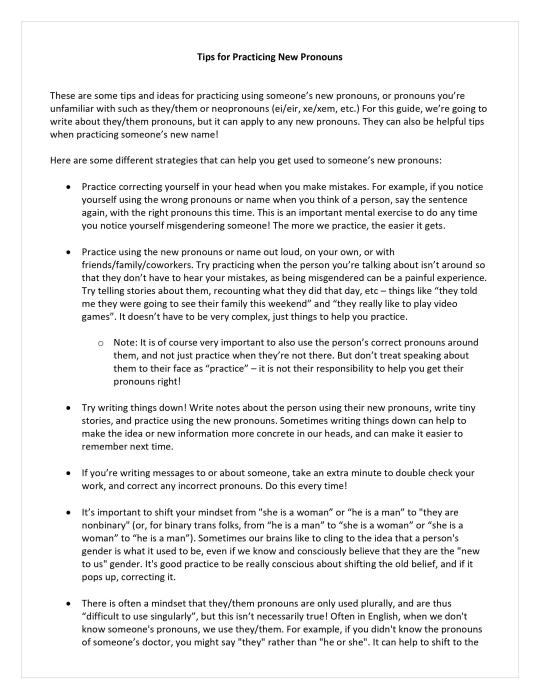
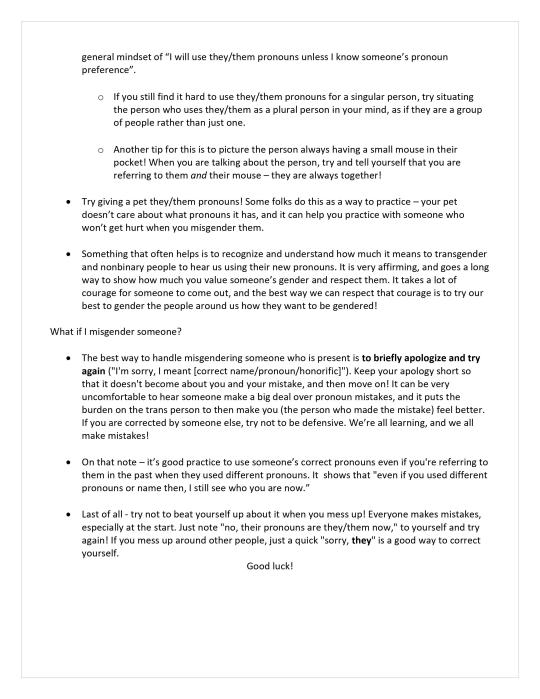
So, I'm not sure if this is helpful for anyone, but a while back I wrote a 'how to practice using someone's new pronouns' guide that I sent to a friend of mine who's kid started using pronouns they weren't familiar with. It's using ideas that I've found helpful, or have heard others found helpful.
Please feel free to share and use it as you will! Here is a link to the PDF if you don't want to use the JPG here, and an ID is below!
Link to google drive: https://drive.google.com/file/d/1KBnJ8_20zcEiQd1nJZgCbrwJ1EEqy80Z/view?usp=sharing
[ID copied from Alt: two images that have the following text:
Tips for Practicing New Pronouns
These are some tips and ideas for practicing using someone’s new pronouns, or pronouns you’re unfamiliar with such as they/them or neopronouns (ei/eir, xe/xem, etc.) For this guide, we’re going to write about they/them pronouns, but it can apply to any new pronouns. They can also be helpful tips when practicing someone’s new name!
Here are some different strategies that can help you get used to someone’s new pronouns:
Practice correcting yourself in your head when you make mistakes. For example, if you notice yourself using the wrong pronouns or name when you think of a person, say the sentence again, with the right pronouns this time. This is an important mental exercise to do any time you notice yourself misgendering someone! The more we practice, the easier it gets.
Practice using the new pronouns or name out loud, on your own, or with friends/family/coworkers. Try practicing when the person you’re talking about isn’t around so that they don’t have to hear your mistakes, as being misgendered can be a painful experience. Try telling stories about them, recounting what they did that day, etc – things like “they told me they were going to see their family this weekend” and “they really like to play video games”. It doesn’t have to be very complex, just things to help you practice.
Note: It is of course very important to also use the person’s correct pronouns around them, and not just practice when they’re not there. But don’t treat speaking about them to their face as “practice” – it is not their responsibility to help you get their pronouns right!
Try writing things down! Write notes about the person using their new pronouns, write tiny stories, and practice using the new pronouns. Sometimes writing things down can help to make the idea or new information more concrete in our heads, and can make it easier to remember next time.
If you’re writing messages to or about someone, take an extra minute to double check your work, and correct any incorrect pronouns. Do this every time!
It’s important to shift your mindset from "she is a woman” or “he is a man” to "they are nonbinary" (or, for binary trans folks, from “he is a man” to “she is a woman” or “she is a woman” to “he is a man”). Sometimes our brains like to cling to the idea that a person's gender is what it used to be, even if we know and consciously believe that they are the "new to us" gender. It's good practice to be really conscious about shifting the old belief, and if it pops up, correcting it.
There is often a mindset that they/them pronouns are only used plurally, and are thus “difficult to use singularly”, but this isn’t necessarily true! Often in English, when we don't know someone's pronouns, we use they/them. For example, if you didn't know the pronouns of someone’s doctor, you might say "they" rather than "he or she". It can help to shift to the general mindset of “I will use they/them pronouns unless I know someone’s pronoun preference”.
If you still find it hard to use they/them pronouns for a singular person, try situating the person who uses they/them as a plural person in your mind, as if they are a group of people rather than just one.
Another tip for this is to picture the person always having a small mouse in their pocket! When you are talking about the person, try and tell yourself that you are referring to them and their mouse – they are always together!
Try giving a pet they/them pronouns! Some folks do this as a way to practice – your pet doesn’t care about what pronouns it has, and it can help you practice with someone who won’t get hurt when you misgender them.
Something that often helps is to recognize and understand how much it means to transgender and nonbinary people to hear us using their new pronouns. It is very affirming, and goes a long way to show how much you value someone’s gender and respect them. It takes a lot of courage for someone to come out, and the best way we can respect that courage is to try our best to gender the people around us how they want to be gendered!
What if I misgender someone?
The best way to handle misgendering someone who is present is to briefly apologize and try again ("I'm sorry, I meant [correct name/pronoun/honorific]"). Keep your apology short so that it doesn't become about you and your mistake, and then move on! It can be very uncomfortable to hear someone make a big deal over pronoun mistakes, and it puts the burden on the trans person to then make you (the person who made the mistake) feel better. If you are corrected by someone else, try not to be defensive. We’re all learning, and we all make mistakes!
On that note – it’s good practice to use someone’s correct pronouns even if you're referring to them in the past when they used different pronouns. It shows that "even if you used different pronouns or name then, I still see who you are now.”
Last of all - try not to beat yourself up about it when you mess up! Everyone makes mistakes, especially at the start. Just note "no, their pronouns are they/them now," to yourself and try again! If you mess up around other people, just a quick "sorry, they" is a good way to correct yourself.
Good luck!
End ID.]
145 notes
·
View notes
Note
can you make headcanons of the gang learning creole from the shepards??
anon,,,r u,,,,🇭🇹🇭🇹🇭🇹🇭🇹???🤨🤨 /lh
BUT OF COURSE!!!! the gateway to get me to answer any ask is to make it about the shepards and them being haitian i swear
•ponys already ahead of most of em bc he hangs out w curly a lot, hes picked up a few words and phrases
•i already hc that darry knows french bc he learned it in school so hes like the one having the least amount of problems w learing kreyòl
•if u didnt know, kreyòl has some words from spanish and african languages and i hc johnny to be half mexican and steve is african so sometimes they recognize it and theyre like that one wojack of that guy pointing
•im gonna be so fr its rlly only tim taking it seriously and teaching em, angelas only teaching them bad words and curlys flirting w pony, stupid ik but its happening much to the dismay of literally everyone
•when it comes to kreyòl, how u say it is how its spelled and two bit swore he would get this shit the first try and then he didnt, he barely getting it on his tenth bc he had to be explained that its said how its spelled using the HAITIAN alphabet, he was just using the regular ass alphabet the whole time
•then it opened up an argument of “then its not rlly said how its spelled” w two bit and literally everyone else but we’ll ignore that
•darry learned french in high school and he was barely grasping that fuck ass gendered language bc why is a table a girl, and he was so mentally prepared to have to do the same w kreyòl but when tim told him kreyòl isnt gendered and its rlly only context based so to say “he, she, it” is “li” and to say “they” in plural is “yo” , ik he jumped for joy, he was so tired
•back to kreyòl being spelled how u say it, when pony learned that curlys heart jumped to his ass cause ponyb started writing down what curly said and asking tim to translate, everytime he gets caught tim just gives him a look and curly pretends hes smug about it but he is not, hes shitting his pants as we speak
•i hc dallas to be russian and he already has a BIT of an accent when speaking english but when it comes to him actually talking in kreyòl its even more obvious cause ur not rlly supposed to pronounce the r’s but he literally keeps on doing it over and over somewhat in a russian accent on accident, and now tim just chuckles a bit when dally speaks kreyòl
•also i JUST remembered i also hc sylvia as haitian, so dallys also getting some help from her but also hes learning kreyòl bc he wants to know wtf she says under her breath when theyre in arguments
•i would say also bc he wants to know what tim says in arguments, but tim will gladly translate for him, however also some insult r just,meant for kreyòl, it literally only hits hard in kreyòl so he doesnt rlly translate those ones, but when he tells sylvia she laughs at dally and tells him what it means
•she also giggles at dally speaking kreyòl hes getting bullied at every angle
•i say this w sm love but dally and soda cant rlly read all that well, they were those kids that took a bit of time reading during popcorn reading and yknow what, no hate about that here, still love em the same, but sometimes tim lets them read something in kreyòl and theyre stuttering SO bad
•i joke about pony not knowing shit in kreyòl, but pony and curly speaking in kreyòl to each other guys,,,pls,,listen to me here,,,,i need it</333
•angela taught them some songs in kreyòl ill hold onto this hc till i die
okok im stopping myself here before this gets any longer but pls know i will be going insane about this later
#curly shepard#ponyboy curtis#purly#PaperCut ship#tim shepard#angela shepard#darry curtis#dallas winston#darrel curtis#sodapop curtis#johnny cade#steve randle
32 notes
·
View notes
Text
2 years and over 40k posts and I'm only making a pinned post now
TALK TO ME!!! i love talking even if im awkward
also pls tag me in things
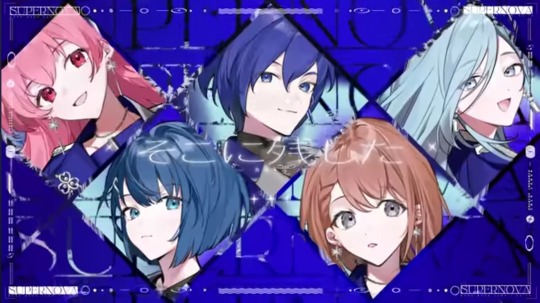
i can't fit everything in my bio so here we go
my names are kia, kyrie, neptune, and jack and i use he/it pronouns. friends can call me mafuyu (or yuki etc) as well. I'm dogkin. i have a pronouns page if you want more info
we're plural. the others used to have their own blogs but now they js post here
my dc is averagemafuyukinnie
I'm taken!! idm flirting jokingly just dont do it srsly. ill probably yap abt my gf a ton
I'm a minor so don't be weird please!!! adults can interact tho it's fine. again just don't be creepy
I'm from italy and i speak italian, english, some french, and I'm trying to learn spanish
i mainly post about project sekai, but I'm also in other fandoms such as:
in stars and time (I'm still on act 2 so no spoilers)
needy streamer overload
bocchi the rock
toilet bound hanako-kun (rereading the manga rn)
assassination classroom
doki doki literature club
pokemon (kinda)
sk8 the infinity
vocal synths (vocaloid, utau, etc)
alien stage
dandadan
and probably more i forgot
some of my all time fav characters/ships are:
saki tenma
kasane teto
mafuyu asahina
ena shinonome
miu takagi
leo/need
niigo
ryo yamada
kikuri hiroi
kangel/ame
siffrin
till
hyuna
momo ayase
harusaki
ruinene
mafuena
mizurui
shihomiu
ichikanahona
sakian
sakiena
ivantill
mizisua
probably more
bolded ones are hyperfixations/all time faves
i also have a couple f/os but im not telling
non fandom related interests:
dogs
birds
animals in general actually
music
guitar + bass guitar
idk i forgot. i like a lot of things
i also draw sometimes!!! you can find my drawings in the #kyrie art tag
i run @sakitenma-everyday as well as a few rp blogs: @hinomori-shihofficial @junior-high-mizuki-official @werewolf-enanan @transfem-saki-official @miu-takagi-official @honahona-ln @sup3rn0v4-mmj @mafurs @poketrainer-yuki. i also have an agere blog
if you need me to tag anything feel free to ask, i tag with "#tw [thing]". if i forget to tw anything feel free to remind me. I won't tag caps or swearing bc i use them a lot
for me, please tag emetophobia, graphic gore, graphic sh and animal death. ny catchall tag is '#neptune look away' but the normal tags are ok too
while i do my best to use tone tags when necessary, I'd prefer them being used as little as possible when talking to me (or just dont use them at all)
dni if you're lgbtq+ phobic in anyway (especially terfs fuck off), sh/ed blogs, pedos/zoos, zionists, pusu supporters, anti-endos, and if you think transandrophobia isn't real
do not drag me into any kind of discourse
25 notes
·
View notes
Note
You are an IWTV fan from France! Please tell me, how good is is the spoken French in the show? How well are the actors doing with their French?
Their French is objectively fine, like, if Sam Reid was talking to me in french I'd understand him, however he doesn't sound native at all, and I struggle to buy that Lestat is supposed to be french.
Sometimes, the translation is a bit off or too literal. For example: "I don't like windows when they're closed" was translated into "I don't like window (singular) when closed (plural)".
The french vampires in Armand's original coven were unintelligible to me, I understood them through the English translation (which as you can imagine felt fucking weird). I don't mind Jacob Anderson's accent because Louis actually says he's rusty on his mother tongue so he gets a pass. Same goes for Delainey Hayles as Claudia gets called out by Madeleine on her terrible french.
Talking about Madeleine, I'm actually pretty sure the actress is French. Her french really sounds like a posh parisian woman's accent (though the character isn't posh).
But the absolute funniest to me is Assad Zaman's accent. Like, he's got the same accent some immigrants get after 20 years in France. And it's hilarious to me because Armand says french is his fourth language and not the one he's best at. He speaks it better than Lestat, a supposedly native speaker.
Hope this helps :')
36 notes
·
View notes
Text
Feanor and 'thou'
So, as some of you probably know, older English has respectful-or-plural second person (you) and intimate-or-derogatory singular second person (thou).
Hence, "get thee from my gate" is not only a bit rude, it clearly implies that Feanor sees Melkor as someone of a lower status than himself.
But you know where else does he do the "thou"? (TBH I don't have the Silm in English, I'm not sure if he calls anyone at all "you")
Yes, Fingolfin. But to a brother is pretty standard. But
Our word hear thou, Eru Allfather!
At first look it sounds normal, at least would to Tolkien, because we use "thou" in prayers, because God as Father, intimacy, we call our dad and mom "thou" or we would in older English. (Unless they're problematic.)
But... Does Feanor really go for the intimate "thou" here?
I'm not so sure. You wouldn't say "my dear, doom me to Eternal darkness if I don't do The Thing". Or maybe you would, idk, I wouldn't.
Tldr: Feanor disses everyone.
I wish I had a line of him speaking to a singular Vala, but I'm sure convinced of would also be "thou".
(also, a word with thorn is automatically better than a word without the thorn? But I don't know how those words look in Quenya, I'm just pretty sure that it has two different words too)
#tolkien#silmarillion#silm#tolkien legendarium#feanor#the silmarillion#the silm#tolkien linguistics#oath of feanor#linguistics#thou
45 notes
·
View notes
Note
Just discovered while talking to someone in Spanish that "Adiós" is more of a permanent goodbye, something you might say to someone you expect to never meet again, like a stranger. Instead, he said I should use "nos vemos" when speaking with people I know, which makes sense. I was wondering what other goodbyes I could use that aren't permanent? Obviously there's "hasta luego" and "hasta mañana."
I wouldn't go that far necessarily, but yes adiós can be used for people you don't expect to see for a long time (possibly never again like sayonara means in Japanese)
Literally, adiós is "go with God" which would have been a lot more impactful in the time of needing to journey days/weeks/months to meet some relatives, and possibly having to deal with war, disease, wild animals etc
A lot of Western langauges have something similar, even "goodbye" is "God be with you/ye"
Some people do use it for a permanent goodbye. Others use it for an indefinite but probably long period of goodbye
And some people just say adiós as a standard goodbye with no deeper meaning other than "bye"
Note: You can also say adiosito which I wouldn't necessarily recommend outside of friendly conversation since it can sound sarcastic; it's like "toodle-oo" but it's literally a little goodbye
Note 2: If you vehemently hate someone and you hope to never see them again, you can say hasta nunca which is like "see you never" and I think that's beautiful
-
Today people do use adiós just as "goodbye" though it can read as "we won't see each other for a while"
The more short-term is nos vemos "we will see each other"
Another variation is a direct object version rather than reflexive. You can say te veo pronto "I'll see you soon" for example, instead of nos vemos pronto "we will see each other soon", that sort of thing
-
There's also hasta pronto "see you soon", hasta la próxima "see you next time"
And a lot of people have adapted certain words into Spanish like bye/bai or chau/chao for goodbyes
chau/chao in particular comes from ciao and is super common especially in South America
Another common one I say is cuídate "take care of yourself" / cuídese for polite, cuídense for plural
Depending on context you can also say ¡Suerte! "Good luck!" (or ¡Buena suerte! or ¡Que tengas mucha suerte! "Hope you have lots of luck" or te deseo mucha suerte etc)....
Another common one I say is ¡Ánimo! which means something like "Chin up!" but literally it's "energy" or "cheer"; if you're saying ánimo with someone you're essentially saying ¡Aguanta! or ¡Resiste! which is like "Hang in there!" or trying to pep someone up, where animar is "to cheer someone on" so it's all related there
-
Also I know you said spoken but just in case, if you're signing off on a letter/email there are some basic phrases you can use:
saludos = (a generic kind of goodbye) [lit. "salutations" or "regards"] un cordial saludo = (something like "kind regards")
atentamente = "yours truly" / "sincerely" [lit. "attentively"]
estamos en contacto / estaremos en contacto = "we'll be in touch"
And if you're writing a friendly letter you can say abrazos or besos for "hugs" and "kisses" respectively; it's very common to say something like te mando un abrazo "I'm sending you a hug" or something like that
-
Also, if you're at a party or something, you can say something like ya me voy or me largo or something like "I'm heading out"
I tend to say something like hora de irme "time for me to go" because in my English-speaking brain saying me largo feels awkward like I'm storming out but I know that's not what that always means
Additionally you can say debo irme "I should go", something along those lines is pretty standard
-
If you're being funny, I think me piro vampiro is somewhat used in Spain (but maybe not so much now)... it's just there for the rhyme. Literally "I'm out, vampire" or "I'm leaving, vampire" [pirarse is an idiomatic way of saying "to leave"]
For Latin America, more common would be chao/chau pescao which is literally "goodbye seafood/fish" since pescao is an informal spelling of pescado where the D can kind of be aspirated
You may also see/hear chao/chau bacalao "goodbye cod"
Again, all for the rhyme. The equivalent of "see you later alligator" in English. Everyone loves a rhyme
But obviously only do this among friends because it's informal and a bit childish
#followers?#learn spanish#spanish#spanish vocabulary#langblr#language#languages#spanish language#long post
403 notes
·
View notes
Note
Minorly annoyed that Billy uses the word warlock here as the masculine equivalent to witch as if he hasn't previously used 'witch' as gender neutral AND talked about warlock being a pejorative term for magic users that he personally does not like using... 'wiccan' would be the masculine term for a witch, that's why... he calls himself Wiccan...
Where are you getting the idea that "wiccan" is a masculine term for "witch"? That's not how we use it in the present day, nor is that the reason given in the comic.
Historically, my understanding is that "wiccan"-- or something like it, as these are all anglicizations-- was used either as a verb, meaning "to practice [witchcraft]," or as a plural form of the singular nouns "wicce" (feminine) and "wiċċa" (masculine.) "Warlock," from the Old English "wǣrloga," does in fact translate to "breaker of oaths," as stated in Young Avengers #10, and was taken more broadly to mean "traitor," "betrayer," or "deceiver." The term came to be used as a substitute for "witch" in an explicitly Christian context-- it was used to describe those who'd broken their Christian vows by making deals with devil. It has been used popularly as a masculine alternative for the conventionally feminine "witch" since the 20th century, which is probably more recently than a lot of people realize.
So, for several reasons, the "witch/warlock" gender dichotomy is not historically accurate, and culturally speaking, it's not always appropriate. Pop culture tends to default to this language, and I'd like to move away from that-- and if I were writing a book with multiple Jewish and Romani witch characters, this is exactly the sort of thing I would want to be mindful about. Representation is about more than giving a character brown skin and cramming in a bunch of little cultural/linguistic tidbits. Sensitivity is just as important.
Billy's feelings about "warlock" are inconsistent-- in Young Avengers #7, he actually chooses it over "witch," but three issues later, in #10, he rejects "warlock" and insists on being called a "witch." If you ask me, I think Heinberg himself was just figuring things out as he went along, and I genuinely don't think he knew anything about Wicca when he decided to call the character that. In hindsight, it gives the impression that Billy himself was doing research off-page and changed his mind about "warlock" after learning the etymology. But I do think it's noteworthy that Billy, having negotiated this aspect of his identity twice on-page, lands on the conventionally feminine option of "witch"-- it compliments a lot of the other choices Heinberg made and paints a very specific portrait of what kind of young, gay kid Billy represents.
#billy kaplan#wiccan#language#warlock#Oh-- and it's not a perfect fit but Emerald Warlock is an example of a character who's from approximately the right background that it make#sense for him to call himself that. Even though I know Robinson was just doing an opposite color/opposite gender thing.
11 notes
·
View notes
Text
Yu-Gi-Oh! Go Rush!! Episodes 109 Sub Release
Torrent
Support us on ko-fi
Please make sure to read the FAQ if you have any questions.
There are very long translation notes below, so spoilers ahead.
-------------------------------
余 yo Dark Meister's pronoun / The "Royal We"
I made an extra translation note appear in the episode itself as well, because initial test screenings of the episode produced some confusion on the Dark Meister's "we" pronoun.
余 (yo) is a very old, archaic pronoun that was used by shoguns or other rulers. To simulate the same regal effect it gives, our English equivalent is the "Royal We".
"The royal we (also known as the majestic plural or royal plural) is the use of a plural pronoun used by a single person who is a monarch or holds a high office to refer to themselves." (Wikipedia)
The note here is just that while the pronoun itself is plural, it does not necessarily mean that the person using the pronoun is speaking in plural. The "Royal We" is a singular pronoun basically used in place of "I" by royalty.
On pronouns, character voice, and translation
With the next episode being titled ワレのターン (ware no taan), with a heavy emphasis on ワレ (ware) being related to Zwijo, I felt like this was a very good chance to talk about this.
Given how meticulous each Go Rush character has their own way of speech and pronouns to refer to themselves, I place a lot of emphasis on making sure that some of that nuance translates to English. Of course, it's impossible to make it 1:1, and usually pronoun choice is something that's glossed over in other translated works, but it means a lot to me so I place more importance on it.
Things like Yuudias speaking without contractions (which, while it makes his speech sound weird, is the point), making some characters speak more flowery than others ("don't know" vs "know not"), etc - are all part of this interpretation of their speech patterns, pronouns, and quirks.
As a minor example, here is a list off the top of my head of all the non-conventional pronouns used by characters in Go Rush:
ソレガシ (soregashi) - Yuudias
コレガシ (koregashi) - Kuaidul
アタイ (atai) - Dinois
私 (watakushi) - Yuuna
サ (sa) - Sabyuas
Again, just some I can list off the top of my head.
Yuudias and Kuaidul's dual opposing pronouns are even more important knowing what we know now of their dynamic. Do you remember when Yuudias said this in episode 90?
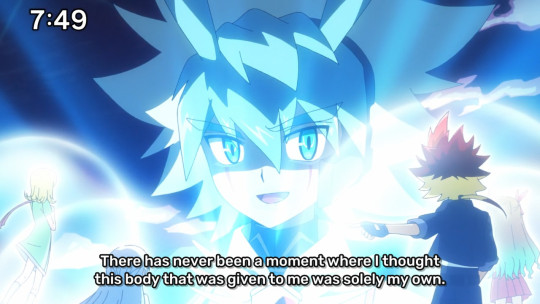
In Japanese, それ (sore) and これ (kore) are placement markers meant to denote whether something is close to you or not. これ (kore) means it's close to you, while それ (sore) means it is close to someone else.
In Yuudias' case, when he uses ソレガシ (soregashi), he quite literally embodies what he meant when he said there was never a moment he thought of his body as his own. After all, he has always been referring to himself as being close to someone else, not himself.
Kuaidul is the inverse of this - he has always thought of his body as his own, and to an extent also Yuudias' body as his own. When these two characters speak, you are meant to get the sense that Yuudias and Kuaidul are speaking in regards to each other, that they are next to each other, intertwined and similar.
I know the Go Rush writers themselves also place a lot of meaning on subtle things like this. When Zwijo was first introduced, one of the writers tweeted that Zwijo's Japanese captions for his summon chant (and by extension, all of the other Velgearians) should not be written normally but instead written entirely in katakana, because they are aliens.
The implication being that Zwijo and Yuudias are 1) speaking with an accent but also 2) meant to be perceived foreign by forcing all of their summon dialogue through this "filter". It makes it way more awkward to read even if, in the end, they are just speaking Japanese. It's one of the ways they can use text to emphasize how different the Velgearians are without completely alienating (ha) their audience.
Character speech patterns are basically a special interest of mine - for example, Spectre's "preview line" in Duel Links ("yoroshiku onegaishimasu") was something I recognized as him immediately despite it being a common phrase, because he's one of the only characters that speaks in such a polite and formal way. It's that one thing he always says before a duel. It's uniquely him despite the phrase being completely ordinary. This is what character speech and character voice mean to me.
All this to say, it's impossible to translate Zwijo's ワレ (ware) in ワレのターン (ware no taan), the title of the next episode, without a bad-looking translation note at the very top. But it's undoubtedly his, and undoubtedly referring to him. It's just unfortunate this is lost in translation / won't be picked up on by people who don't know what his pronoun is or the significance of it.
I hope that gives you some insight into how the translation process for character voice works!
32 notes
·
View notes
Text
Ch 206: Lost in Translation
Yana is amazing and blows me away more and more every chapter.
In this one, a few amazing moments won’t translate, so I wanted to point them out.
Warning: this post has major spoilers for Ch 206. Proceed with caution.
Note: This post talks about first-person Japanese pronouns, but you don’t need to know much about them to follow this post. Just that Japanese has many ways to say “I,” often that can be personal or apply for different situations. You can read more about them here.
At one point in ch 206, both Doll and Finny shout at the same time about who their enemy is. While Finny points the finger at Doll (and company), Doll insists it’s Phantomhive who is the real foe.
What’s really cool here and probably will be lost in the English is that we can see how Finny and Doll each speak slightly differently— Finny uses “boku” (僕, here in the plural form) while Doll uses “ore” (オレ, also in plural).

Another instance that again uses first-person pronouns is when Snake first realizes that his “family” was kidnapping children and everything he believed was a lie, he breaks down.
He’s so upset he doesn’t even know how to speak, running through three different pronouns: first 私 (watashi), then 僕 (boku), and lastly, 俺 (ore, in kanji form here).
Because Snake almost always speaks via his snakes and not as himself, this moment is even more significant, in my opinion. It’s almost as if we see his self fracturing. It’s painful and something that probably won’t come off as impactful with English having only one way to say “I.”
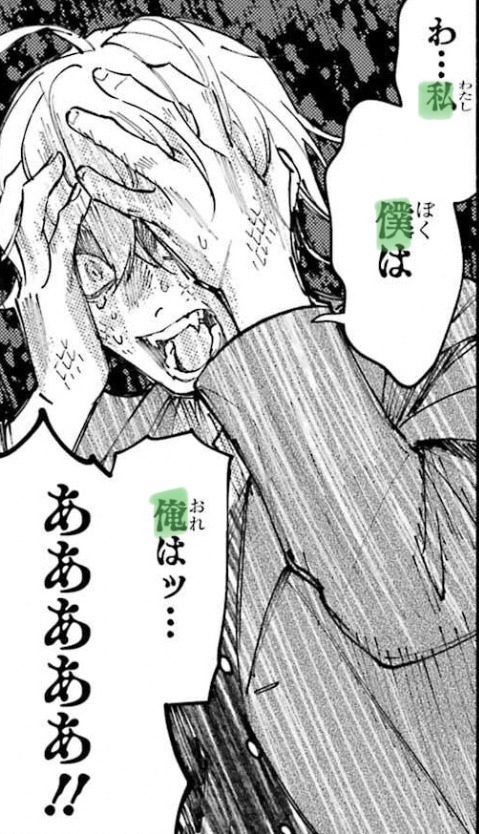

Then, at the end of the chapter, once Snake has been forced to realize the troupe and Doll weren’t who he thought they were, his self shatters and we see him again go through different pronouns—this time only watashi (私) and ore (俺), but it still illustrates how this quite literally “breaks” his spirit, his identity.
It’s even more interesting when we’re already dealing with the theme of “substitutions” or “counterfeits” to the “real thing” with the clone orphans. Pulls in that famous line about lies becoming truth in a painful way, doesn’t it?
Please respect my time and money put into these translations and do not reuse my content without credit.
#black butler#黒執事#ch 206#kuro spoilers#poi translation#poi og#snake#finny#doll#first person pronouns
79 notes
·
View notes